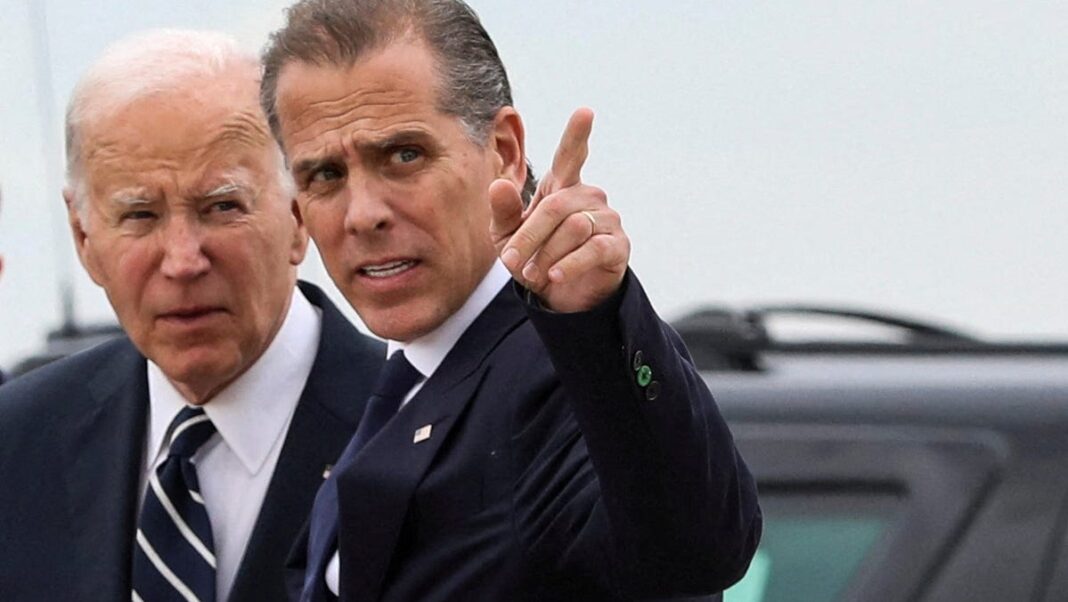Legal analysts describe President Biden’s pardon of Hunter Biden as ‘unprecedented’ and ‘very unusual’
WASHINGTON – The pardon granted by President Joe Biden to his son, Hunter Biden, is considered an exceptionally broad and rare case of executive clemency, according to legal experts.
The president’s pardon covers any federal offenses “he committed or may have committed” from January 1, 2014, until the end of this year. Experts in law pointed out similarities between this comprehensive pardon and former President Gerald Ford’s pardon of Richard Nixon after the Watergate scandal.
Margaret Love, who served as the U.S. pardon attorney from 1990 to 1997, stated, “It’s very broad,” labeling it “unprecedented” aside from Nixon’s case. She noted that it does not specify any particular crimes, but instead provides blanket immunity for any offenses that could have occurred during this time period.
Many legal experts expressed concern over the extensive nature of the pardon, stating that it protects Hunter Biden from any federal charges—present or future—stemming from his actions in the specified years.
Mark Osler, a law professor at the University of St. Thomas and a pardon specialist, remarked, “This is very unusual. It’s already rare for clemency to be granted in cases without a conviction, but this particular breadth is even rarer.”
Pardon shields Hunter Biden from unspecified offenses
Hunter Biden was convicted in a Delaware trial for illegally purchasing and possessing a firearm while being a drug addict. He also admitted guilt in California for failing to pay taxes over several years during the same timeframe.
The convictions followed a plea agreement that collapsed in July 2023, which could have spared him jail time, but drew criticism from congressional Republicans who deemed it overly lenient.
U.S. District Judge Maryellen Noreika rejected the proposed plea deal due to disagreements regarding its scope. Prosecutors noted that they could have pursued further investigations into Biden’s undisclosed foreign business dealings under the Foreign Agents Registration Act (FARA), which Biden’s legal team contested.
In addition to potential FARA violations, the pardon would also protect Hunter Biden against any other prospective federal offenses during the specified ten years.
“What’s unusual here is that this pardon applies to unspecified crimes,” Osler added.
Love raised concerns about whether Biden’s pardon was issued following consultations with the Justice Department, a common procedure for presidential pardons.
“It saddens me, as it seems that the power has gradually been taken away from the justice system,” Love remarked. “In reality, it hasn’t been gradual at all, but rather quite abrupt.”
Presidents have previously pardoned family members
When Donald Trump was president-elect, he pardoned multiple political allies, including former chief strategist Steve Bannon, campaign manager Paul Manafort, national security advisor Michael Flynn, and Republican operative Roger Stone, at the conclusion of his first term.
What sets Biden’s pardon of Hunter Biden apart is that it involves a family member. Prior to Hunter, no president’s child had been charged or convicted of crimes. However, there have been clemency cases for other relatives.
For example, former President Bill Clinton pardoned his half-brother, Roger Clinton, on his last day in office for a drug-related conviction stemming from 1985. Roger had served more than a year behind bars after admitting to drug conspiracy.
Additionally, Trump pardoned his son-in-law’s father, Charles Kushner, who was found guilty of filing false tax returns, intimidating a cooperating witness, and making false statements to the Federal Election Commission in 2005. Kushner spent over 16 months in a federal prison after serving part of a two-year sentence, with Trump recently announcing plans to appoint him as the next U.S. ambassador to France.
Is Trump Able to Pardon Himself?
The Constitution’s Article 2 grants the president the authority “to grant reprieves and pardons for offenses against the United States, except in cases of impeachment.”
Donald Trump, who has dealt with two federal indictments, has mentioned the possibility of pardoning himself, but this topic is still legally contested. Legal authorities are divided on this issue.
In a 2018 statement on X, Trump claimed, “As many legal scholars have noted, I have the absolute right to PARDON myself.”
Charges against him were dismissed by special counsel Jack Smith due to a long-standing policy that prevents prosecuting sitting presidents. However, the charges were dropped in a manner that could allow them to be reinstated after Trump vacates the presidency.
While some legal academics assert that a president can pardon themselves, others hold an opposing view.
According to legal expert Osler, Trump has the power to issue a self-pardon, but it remains uncertain whether a future Justice Department would recognize or contest it.
“Certainly, Trump has the ability to create a pardon warrant that includes himself,” Osler explained. “The significant factor would arise if another administration tried to bring charges against him while he claims to have been pardoned for those actions.”

